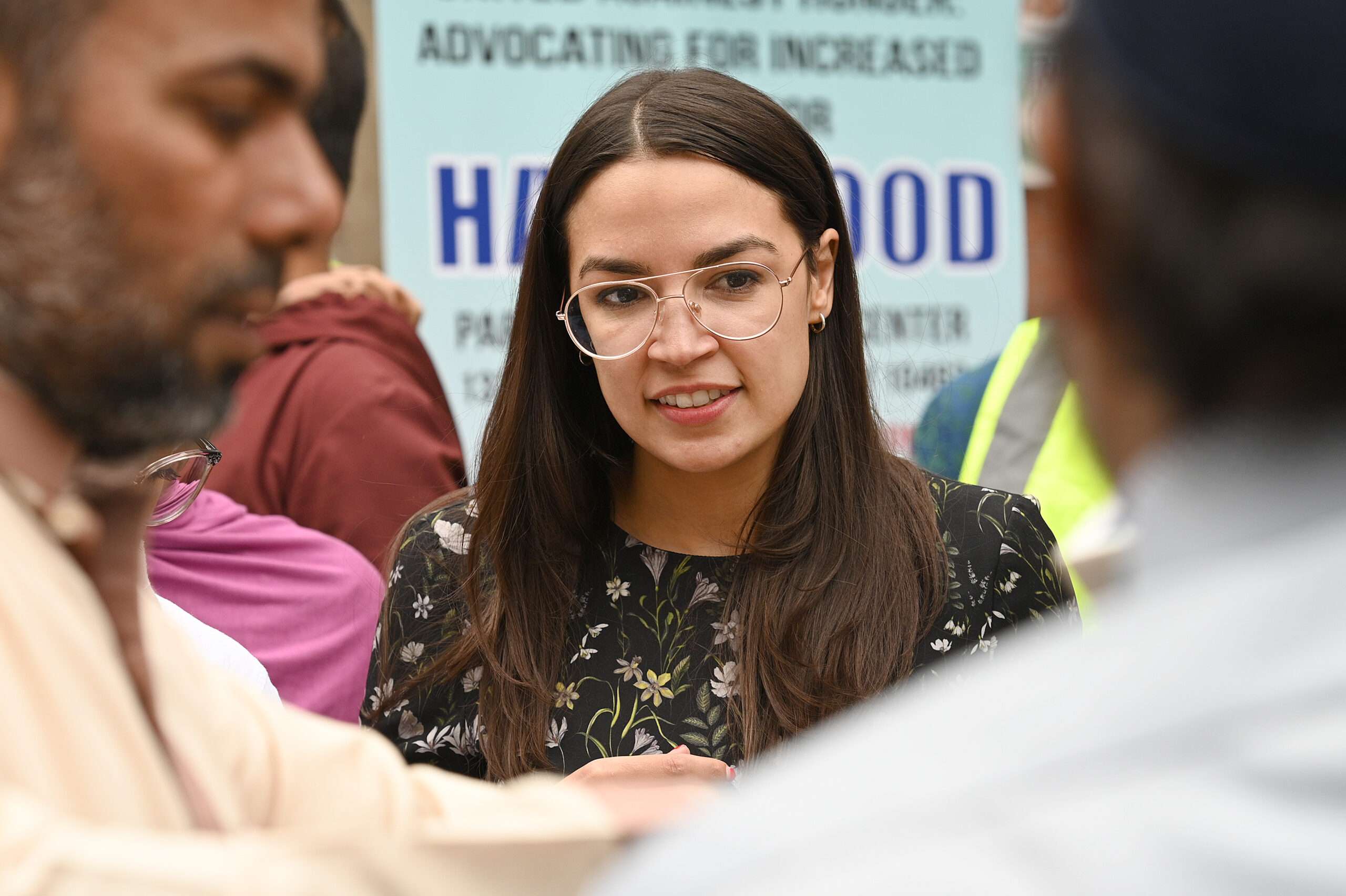You are using an out of date browser. It may not display this or other websites correctly.
You should upgrade or use an alternative browser.
You should upgrade or use an alternative browser.
AOC Says Something Ignorant
- Thread starter GURPS
- Start date
Rep. Alexandria Ocasio-Cortez, D-N.Y., responded on Twitter after Republican presidential candidate Nikki Haley put the Democrat’s name on a list alongside other Democratic lawmakers who voted against a House resolution expressing America’s support for Israel.
"Oooh, a list!" Ocasio-Cortez responded as her name joined Reps. Jamaal Bowman, D-N.Y.; Rashida Tlaib, D-Mich.; Ilhan Omar, D-Minn.; Summer Lee, D-Pa.; Ayanna Pressley, D-Mass.; Cori Bush, D-Mo.; Andre Carson, D-Ind.; and Delia Ramirez, D-Ill.
The nine Democrats voted against the resolution, which ultimately passed 412-9. One other Democrat, Rep. Betty McCollum, D-Minn., voted "present."
Ocasio-Cortez added, "Remember to call it ‘People in Congress who think apartheid is wrong’ or alternatively, ‘People in Congress who don’t ignore human rights abuses against Palestinians.’"

 www.foxnews.com
www.foxnews.com
What an elementary school response ..... what7 a childish bint
"Oooh, a list!" Ocasio-Cortez responded as her name joined Reps. Jamaal Bowman, D-N.Y.; Rashida Tlaib, D-Mich.; Ilhan Omar, D-Minn.; Summer Lee, D-Pa.; Ayanna Pressley, D-Mass.; Cori Bush, D-Mo.; Andre Carson, D-Ind.; and Delia Ramirez, D-Ill.
The nine Democrats voted against the resolution, which ultimately passed 412-9. One other Democrat, Rep. Betty McCollum, D-Minn., voted "present."
Ocasio-Cortez added, "Remember to call it ‘People in Congress who think apartheid is wrong’ or alternatively, ‘People in Congress who don’t ignore human rights abuses against Palestinians.’"

AOC responds after GOP presidential candidate puts her name, 'Squad' members on a list
Rep. Alexandria Ocasio-Cortez, D-N.Y., reaffirmed her decision to vote against a House resolution that expressed support for Israel. Nine Democrats voted against the bill.
What an elementary school response ..... what7 a childish bint
Is AOC just a regular Democrat now?
You may have heard that Rep. Alexandria Ocasio-Cortez recently endorsed Joe Biden’s reelection campaign. That’s not exactly a surprise since he’s running as an incumbent with no serious opposition. In other words, Bernie isn’t in the race this time around. Still, Freddie deBoer argues it’s not just the endorsement it’s how she did it that felt like a concession to the moderate party she—the revolutionary outsider— has bucked many times in the past.
Alexandria Ocasio-Cortez’s recent appearance on the Pod Save America podcast had, for me, the feeling of a final disappointment, the kind that’s a little sad but brings a set of quixotic hopes to a close. AOC appeared on the popular Crooked Media show to announce her endorsement of Joe Biden for president in the 2024 election. To deliver that particular endorsement while appearing on that particular podcast — where former Obama-administration staffers define the limits of acceptable left-of-center opinion — was to send a very deliberate message. It was AOC’s last kiss-off to the radicals who had supported her, voted for her, donated to her campaign, and made her unusually famous in American politics, the beneficiary of a wholly unique cult of personality that is now starting to come undone.
From there deBoer is off, making a whole bunch of comparisons between the Democratic Socialist AOC and the much more muted and careful politician she is today. For instance, remember these images? This was AOC in 2018 when she was a leftist unknown.
Here’s how deBoer frames it:
…it was a bit depressing, but not at all surprising, to see this champion of the working class at an event in which celebrities wandered around unmasked while their many servants dutifully wore masks to prevent the spread of COVID. Politicians, even lefty politicians, go to fancy events and hobnob with the ruling class; it’s a fact of life. But Ocasio-Cortez tried to have it both ways: she wore white again, this time a dress emblazoned with the words “Tax the Rich” in bright red. And this made her opportunity to rub shoulders with the one percent a matter of direct hypocrisy. It’s one thing to go to the party; it’s another to blare out a message that you disapprove of the party while you’re there.
She hasn’t completely given up on saying no to the party but her decisions about when to do so seem almost random. She voted for the American Rescue Plan even though it didn’t have the increased minimum wage she wanted. And when it came to her opposition to the Iron Dome funding bill, she voted present rather than opposing it (it won by an overwhelming margin so it didn’t matter either way).
Ocasio-Cortez once said, “In any other country, Joe Biden and I would not be in the same party,” an assertion of her distaste for the Democratic Party. Now she seems increasingly comfortable with leaving her past radical branding behind. If she wants to be a docile Democratic senator one day, she should. Just drop the wince-inducing efforts to have it both ways.
Typically, when I criticize Ocasio-Cortez, the response is not to argue that she has actually acted deftly as a politician, much less that she’s demonstrated any consistency between her statements and her actions. Instead, I’m constantly told that the problem lies in expecting anything from her at all. Hey, she’s just one congresswoman! She’s hemmed in by her party and an undemocratic system! She’s constrained by capitalism! Again and again, I’ve been told that asking Ocasio-Cortez for minimal ideological consistency or, even worse, results, is simply to ask too much.
But this defense immediately suggests a rather damning question: If AOC never had a chance to do anything … what have we been celebrating her for? Why has she been subject to such immense, embarrassing hagiography?
As deBoer goes on to say, if there are no results to show for all of this then it’s fair to ask where all the money has gone and why the left keep sending more. His theory is that the disinclination to question AOC’s usefulness in the scheme of things is really backstopped by a greater unwillingness to question Bernie’s role. If you start asking what she’s accomplished you might next have to ask what he’s accomplished and in both cases the answer is not much.
Is AOC just a regular Democrat now?
You may have heard that Rep. Alexandria Ocasio-Cortez recently endorsed Joe Biden’s reelection campaign. That’s not exactly a surprise since he’s running as an incumbent with no serious opposition. In other words, Bernie isn’t in the race this time around. Still, Freddie deBoer argues it’s not just the endorsement it’s how she did it that felt like a concession to the moderate party she—the revolutionary outsider— has bucked many times in the past.
From there deBoer is off, making a whole bunch of comparisons between the Democratic Socialist AOC and the much more muted and careful politician she is today. For instance, remember these images? This was AOC in 2018 when she was a leftist unknown.
Here’s how deBoer frames it:
She hasn’t completely given up on saying no to the party but her decisions about when to do so seem almost random. She voted for the American Rescue Plan even though it didn’t have the increased minimum wage she wanted. And when it came to her opposition to the Iron Dome funding bill, she voted present rather than opposing it (it won by an overwhelming margin so it didn’t matter either way).
As deBoer goes on to say, if there are no results to show for all of this then it’s fair to ask where all the money has gone and why the left keep sending more. His theory is that the disinclination to question AOC’s usefulness in the scheme of things is really backstopped by a greater unwillingness to question Bernie’s role. If you start asking what she’s accomplished you might next have to ask what he’s accomplished and in both cases the answer is not much.
Bernie does buy houses so he has real estate investments. Is AOC still crying about her rent .?
AOC's campaign keeps paying Chinese foreign agent, FEC filings show
The New York Democrat's campaign paid $442 to Sing Tao Newspapers May 25 for print advertisements, according to her campaign's records.
While a small expense, Ocasio-Cortez's committee appears to be the only one to place advertisements in the paper during the second quarter. Her campaign previously sent $5,000 to the company for the same purpose.
Sing Tao U.S. is a subsidiary of the Hong Kong-based Sing Tao News Corporation Ltd. In August 2021, the Justice Department required the Chinese-owned entity to register as a Chinese foreign agent as tensions rose between Washington and Beijing.
After the DOJ determined Sing Tao U.S. constituted foreign political activity, Ocasio-Cortez's campaign dropped nearly $1,500 on advertisements with the company before her most recent payment.
Sing Tao's United States operations include Chinese language publications in New York, San Francisco and Los Angeles. It also has a radio station in Burlingame, California.
"Suncreens in Europe and Asia are better than in the United States because more ingredients are allowed and these create more effective and more pleasing suncreens," he writes.
This is no accident, but rather the deliberate result of regulatory policy. The European Union, for instance, has approved 27 different compounds for use in sunscreen, whereas the FDA has only approved 17.
"The number of approved ingredients matters because not all filters can seamlessly be formulated into sunscreens or other suitable products for skin application," writes the Cato Institute's Gabriella Beaumont-Smith. "Moreover, some of the ingredients approved in the EU and Japan but not the US are more effective and long‐lasting."
If the FDA won't clear more sunscreen ingredients for use in the U.S., the agency should at the very least allow reciprocity: Foreign sunscreens could be made available with warning labels noting that they were approved by European health officials but not by the FDA. Of course, the best option would be for U.S. regulators to simply get out of the way and acknowledge that these products are obviously safe for human use. Indeed, not approving them is the greater danger, since using sunscreen is one of the best ways to prevent skin cancer.

AOC slams the FDA's harmful overregulation of sunscreen
In a recent TikTok video, AOC interviewed esthetician Charlotte Palermino about the abysmally limited sunscreen options in the United States.
I'm glad some people remember the classics. This is the Jean Valjean defence from Les Misérables.
I'm not watching the video, but who got called a media whore today? I was listening from the other room and didn't see it.
